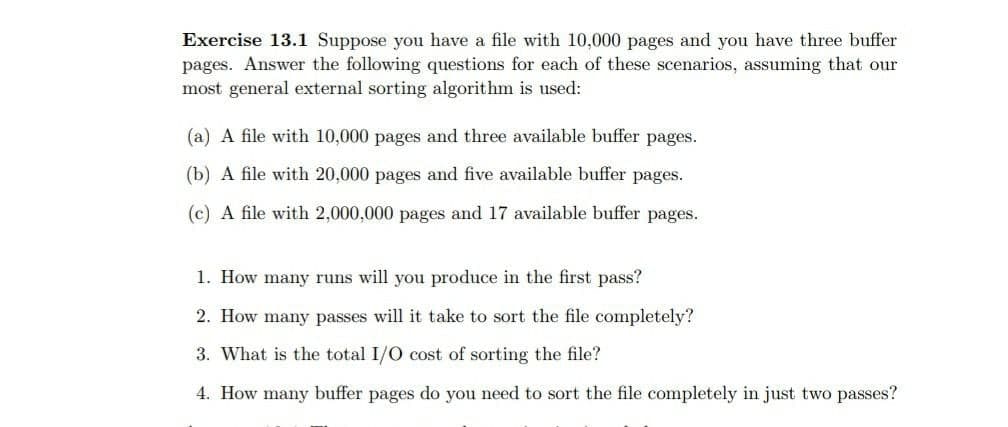Exercise 13.1 Suppose you have a file with 10,000 pages and you have three buffer pages. Answer the following questions for each of these scenarios, assuming that our most general external sorting algorithm is used: (a) A file with 10,000 pages and three available buffer pages. (b) A file with 20,000 pages and five available buffer pages. (c) A file with 2,000,000 pages and 17 available buffer pages. 1. How many runs will you produce in the first pass? 2. How many passes will it take to sort the file completely? 3. What is the total I/O cost of sorting the file?
Exercise 13.1 Suppose you have a file with 10,000 pages and you have three buffer pages. Answer the following questions for each of these scenarios, assuming that our most general external sorting algorithm is used: (a) A file with 10,000 pages and three available buffer pages. (b) A file with 20,000 pages and five available buffer pages. (c) A file with 2,000,000 pages and 17 available buffer pages. 1. How many runs will you produce in the first pass? 2. How many passes will it take to sort the file completely? 3. What is the total I/O cost of sorting the file?
Computer Networking: A Top-Down Approach (7th Edition)
7th Edition
ISBN:9780133594140
Author:James Kurose, Keith Ross
Publisher:James Kurose, Keith Ross
Chapter1: Computer Networks And The Internet
Section: Chapter Questions
Problem R1RQ: What is the difference between a host and an end system? List several different types of end...
Related questions
Question
Help fast

Transcribed Image Text:Exercise 13.1 Suppose you have a file with 10,000 pages and you have three buffer
pages. Answer the following questions for each of these scenarios, assuming that our
most general external sorting algorithm is used:
(a) A file with 10,000 pages and three available buffer pages.
(b) A file with 20,000 pages and five available buffer pages.
(c) A file with 2,000,000 pages and 17 available buffer pages.
1. How many runs will you produce in the first pass?
2. How many passes will it take to sort the file completely?
3. What is the total I/O cost of sorting the file?
4. How many buffer pages do you need to sort the file completely in just two passes?
Expert Solution
This question has been solved!
Explore an expertly crafted, step-by-step solution for a thorough understanding of key concepts.
Step by step
Solved in 4 steps with 3 images

Recommended textbooks for you

Computer Networking: A Top-Down Approach (7th Edi…
Computer Engineering
ISBN:
9780133594140
Author:
James Kurose, Keith Ross
Publisher:
PEARSON

Computer Organization and Design MIPS Edition, Fi…
Computer Engineering
ISBN:
9780124077263
Author:
David A. Patterson, John L. Hennessy
Publisher:
Elsevier Science

Network+ Guide to Networks (MindTap Course List)
Computer Engineering
ISBN:
9781337569330
Author:
Jill West, Tamara Dean, Jean Andrews
Publisher:
Cengage Learning

Computer Networking: A Top-Down Approach (7th Edi…
Computer Engineering
ISBN:
9780133594140
Author:
James Kurose, Keith Ross
Publisher:
PEARSON

Computer Organization and Design MIPS Edition, Fi…
Computer Engineering
ISBN:
9780124077263
Author:
David A. Patterson, John L. Hennessy
Publisher:
Elsevier Science

Network+ Guide to Networks (MindTap Course List)
Computer Engineering
ISBN:
9781337569330
Author:
Jill West, Tamara Dean, Jean Andrews
Publisher:
Cengage Learning

Concepts of Database Management
Computer Engineering
ISBN:
9781337093422
Author:
Joy L. Starks, Philip J. Pratt, Mary Z. Last
Publisher:
Cengage Learning

Prelude to Programming
Computer Engineering
ISBN:
9780133750423
Author:
VENIT, Stewart
Publisher:
Pearson Education

Sc Business Data Communications and Networking, T…
Computer Engineering
ISBN:
9781119368830
Author:
FITZGERALD
Publisher:
WILEY